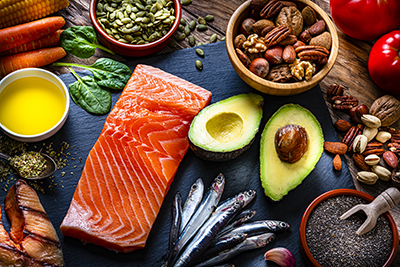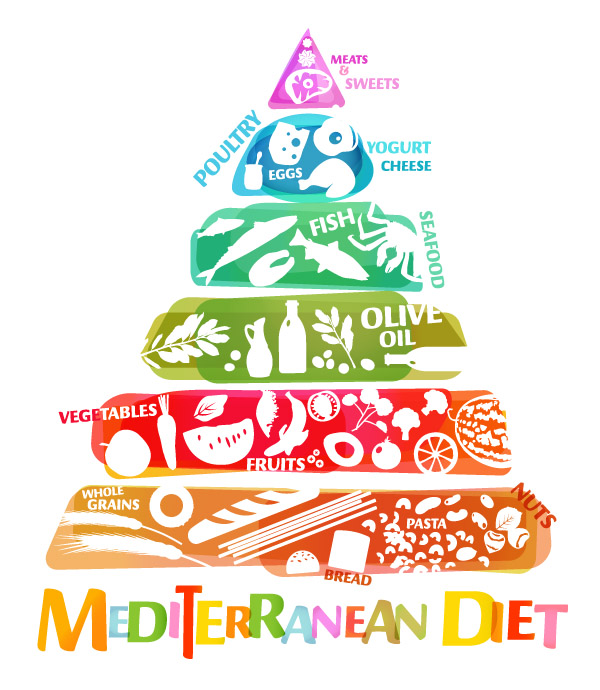
Order Confirmed
We’re sorry, the page you requested could not be found.

First ‘discovered’ as a diet in the 1960s, the Mediterranean diet is a way of eating that has actually existed for centuries. Inspired by the traditional eating habits of people who live near the Mediterranean Sea, it draws on the cuisines of Greece, Italy, France, Spain and Portugal, as well as North Africa and the Middle East.
In recent decades, researchers noticed that those living in Mediterranean countries were exceptionally healthy, had a low risk of many common chronic conditions and often lived to a ripe old age.¹,²
Further studies have supported their claims, showing that the Mediterranean diet, which includes a high intake of olive oil, fish, grains, fruits and vegetables, has been linked to a reduction in cardiovascular disease, coronary heart disease, cholesterol, cancer risk, Type 2 diabetes, as well as neurodegenerative diseases and overall mortality.³,⁴
So it’s no surprise that the Mediterranean diet is often recommended to those seeking to improve their general wellbeing and reduce their risk of chronic disease, including cardiovascular disease.
Read on to learn more about the Mediterranean diet, what foods to eat (and not to eat), and how this simple, traditional way of eating can benefit your health.
Rich in flavorful ingredients like fruits, vegetables, whole grains, olive oil and heart-healthy fats, the Mediterranean diet is both delicious and nutritious. It’s not a fad or restrictive diet - it’s simply about eating more of the wholesome, flavourful foods of the Mediterranean – and reducing your intake of processed foods, meat and sweets.
Those who live in and around the Mediterranean eat high amounts of olives and olive oil, fruits and vegetables, fish, legumes and whole grains; moderate amounts of wine and dairy products (mostly cheese and yoghurt), nuts and seeds; and small amounts of red meat and sweet foods. Very little food is processed and olive oil is used liberally for eating and cooking, rather than butter or seed oils.

In 2020, the Mediterranean diet was assessed as the healthiest diet in the world for the third year in a row by US News & World Report.⁵
One of the many benefits of the Mediterranean diet is that it’s low in saturated fat (the ‘bad fats’) and high in plant-based fats such as polyunsaturated and monounsaturated fats (the ‘good fats’), which helps explain why it’s known as a heart-healthy style of eating.
There is one vital ingredient of the Mediterranean diet that researchers believe may be the key to the extraordinary health and long lives of many people living in and around the Mediterranean – the humble olive.⁶,⁷
Research shows that the natural plant-derived polyphenol compounds found in olives, olive oil and olive leaves – including oleuropein and its primary metabolite, hydroxytyrosol – can improve blood pressure, and help maintain healthy cholesterol and lipids, and blood sugar levels.³,⁴
Extra virgin olive oil contributes high levels of monounsaturated fatty acids and antioxidant phytochemicals: polyphenols, phytosterols and vitamin E to the Mediterranean diet – compounds which are thought to be responsible for many of the health benefits experienced when following the Mediterranean diet.⁶⁻⁸
With many times more antioxidant polyphenols than extra virgin olive oil, olive leaf extract offers a whole new way to healthiness. Today’s science shows that daily use of high-quality olive leaf extract supports heart health and general wellbeing, helping to maintain normal blood pressure, healthy insulin function, healthy blood cholesterol and fats, and normal blood sugar levels.⁶⁻⁸
And it seems the fresher, the better. Olive Life™ Olive Leaf Extract contains up to 30 times more antioxidant polyphenols than Extra Virgin Olive Oil and five times more antioxidant power than Vitamin C.⁹
Our olive leaves are fresh-picked at dawn when they’re fresh, potent and high in polyphenols, including oleuropein – the naturally occurring plant compounds that help olive trees thrive.

The staples of a Mediterranean diet are plant-based foods: fruits, vegetables, grains, nuts, seeds and olive oil. It’s recommended that you eat lots of veggies of different colours to get a wide range of nutrients, phytochemicals and fibre, including fresh, raw vegetables.
Aim to naturally include fruit, whole grains (especially ancient grains) and legumes such as lentils, chickpeas, beans, and peas into as many meals as possible. Remember to use nuts and seeds as a garnish or small snack as they’re higher in calories and good fats. Use olive oil and fresh herbs liberally as a garnish on veggies, salads and fish dishes to add a boost of flavour and heart-healthy goodness.
Consume fish and other seafood at least twice a week (oily fish such as salmon is especially good). Cheese and yogurt can be eaten in moderate portions, and chicken and eggs occasionally. However, eating other ‘meats, sweets and treats’ is very limited.
Highly processed foods are not part of the Mediterranean diet – you’ll see very few nonagenarian Greeks or Italians who’ve eaten highly processed foods in their long life!

Short answer, yes, as long as you eat in moderation (as with any diet). In one of the most successful weight loss trials to date, those assigned to the Mediterranean diet were able to maintain weight loss over a period of six years.⁷
Due to the higher intake of olive oil and less processed foods – the Mediterranean diet can help you feel fuller for longer and is easier to stick with than most fad diets. It’s not about ‘being on a diet’ and losing weight fast – rather it’s about changing your diet to a healthier way of eating, every day, which can result in slower, more sustainable weight loss in the longer term.
Note that the Mediterranean diet pyramid (pictured above) doesn’t specify portion sizes, so it may be helpful to balance it with a healthy eating guide (like the Healthy Heart Guide) to ensure you’re eating the right portions for your age, weight and lifestyle.
Perhaps the most convincing evidence that eating a Mediterranean diet can improve cardiovascular health comes from a randomized clinical trial first published in 2013, known as the PREDIMED study.¹ For about five years, authors followed more than 7,000 women and men in Spain who had Type 2 diabetes or a high risk for cardiovascular disease. Those who ate a calorie-unrestricted Mediterranean diet with extra-virgin olive oil or nuts had a 30 percent lower risk of heart events.
Taking olive leaf extract provides a boost of the beneficial polyphenols found in extra -virgin olive oil. Several scientific studies have shown that olive leaf extract supports heart health - assisting in the maintenance of normal blood pressure and cholesterol levels, as well as supporting the health and function of the cardiovascular system.¹²,¹³
To manage and potentially prevent Type 2 diabetes, a Mediterranean diet may be the way to go. Among other benefits, the Mediterranean diet is rich in fibre and low GI foods which digest slowly, thus helping to prevent huge swings in blood sugar levels.
One of the main complications of Type 2 diabetes is cardiovascular disease, including heart attacks, strokes, high blood pressure and high cholesterol. According to a study published in 2017, eating an olive oil-rich Mediterranean diet for 1.5 years improved arterial blood flow better than a standard low-fat diet in people with Type 2 diabetes and pre-diabetes.¹⁰
What’s more, a four-year follow-up of the PREDIMED study showed that participants who followed the Mediterranean diet had a 52 percent lower risk for Type 2 diabetes, without necessarily losing weight or exercising more.¹¹
According to numerous studies around the globe, yes it does, particularly if you’re concerned about your heart health. Research has consistently shown that the Mediterranean diet is effective in reducing the risk of cardiovascular disease and overall mortality, as well as helping to maintain general wellbeing.¹²⁻¹⁴
In fact, a study of nearly 26,000 women found that those who followed this type of diet had 25% less risk of developing cardiovascular disease over the course of 12 years.15 Other studies have shown significant improvements in blood vessel function, blood pressure, blood sugar levels and cholesterol levels.¹⁶⁻¹⁸
Switching to a Mediterranean diet doesn’t need to be expensive or complicated - the easiest way is to start with small steps, then build up. For example, try:
It has taken decades for the Western world to learn something our Mediterranean ancestors have known for millennia: eating fresh, natural and simple foods can help people stay healthier, for life.
Note: The contents of this blog are for educational purposes and are not intended to offer personal medical advice. You should seek the advice of your physician or other qualified health provider if you have any questions regarding a medical condition. Never disregard professional medical advice or delay seeking it because of something you have read on this website.
References:

We’re sorry, the page you requested could not be found.